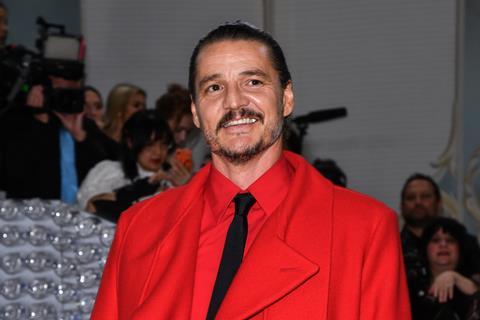Writer Claire Morrison explains why the 'daddification' of Mandalorian and The Last of Us actor Pedro Pascal is something Christians should be concerned about.

Female desire is a shamefully underreported and under-analysed sociological phenomenon. What we thirst for and who we crave speaks volumes about us individually and the larger societal trends that mould us. The boy bands, fictional characters, and internet boyfriends we swoon over show us our idealized version of masculinity, while also exposing us to potential pitfalls in our faith.
Joining the ranks of Mr Darcy, Timothy Chalomet, and the Hot Priest, is Pedro Pascal. You probably know him from a few small projects such as Game of Thrones, Narcos, the Mandalorian, and The Last of Us. He also died a few times in some Law and Order iterations. Despite being in the industry for a few decades, and being consistently good-looking throughout, it is only recently that he has been elevated to sex symbol status.
The Chilean-born actor has drawn the collective female gaze and, oh are we gazing. Popping up all over my Youtube feed is compilations featuring Pascal joking, twinkling, and charming our socks off. Graham Norton even had a whole segment where Pascal was read thirst tweets, summed up by one: "Pedro Pascal is the biggest daddy of them all, a fine older man who will take care of you and love you right." For those of you lucky enough to be ignorant of the term "daddy", just know that Freud would have loved it, and like most things Freudian, ignorance is bliss.
His roles exemplified an altered, softer characterisation of masculinity.
Of the slew of hot actors we could choose to obsess over, what marks him out as the internet’s new crush? Part of his mass appeal is his choice of roles, his two most recent hits, The Mandalorian and The Last of Us, cemented his cult status. More than that, both roles exemplified an altered, softer characterisation of masculinity.
While femininity in mainstream media has transitioned to depict women as having traits that defy traditional gender roles, masculinity has evolved to a collection of hyper-masculine traits accompanied by certain "feminine" outliers. Take Pascal’s character of Joel, a ruthless, militant, self-sufficient man of few words, so far, so masculine. However, Joel’s complexity and thus his appeal lies in the soft, devotion he shows to a lost teenage girl.
The protector role is not new to our male leads. What is new is the extent to which that role shapes Joel. His entire character arc is formed by his willingness to nurture, protect, and provide for his surrogate daughter. And none of these traits ever diminish his "manliness". Or take Pascal’s role as the Mandalorian. A similarly battle-hardened bounty hunter with a tragic backstory, forsakes everything to become a reluctant father figure to an adorable baby Grogu. Who among us does not want a capable, stoic man with a shotgun to take our hand and guide us through the apocalypse?
Who among us does not want a capable, stoic man with a shotgun to take our hand and guide us through the apocalypse?
While his acting is phenomenal, his recent rise to stardom has more to do with his personal allure. Undoubtedly, one of his biggest draws is his apparent "unproblematicness". His interactions with both men and women are playfully flirtatious across the board, being able to stare deeply into the eyes of Sarah Paulson and Oscar Isaac alike without raising an eyebrow. Like his characters, he displays "unmasculine" traits that enhance, rather than diminish his manliness. Pascal is effusive in his compliments, emotionally vulnerable, soft, and sensitive. His uncomplicated and innocent relationship with his 19-year-old co-star is a refreshing palate cleanser compared to, say, Leonardo Caprio, whose dating habits have become more decidedly icky.
The darker side to his popularity is the internet’s tendency to immediately sexualise him. While I will defend any woman’s right to gush over a chiselled jaw-line man with my life, how do fans gushingly referring to Pascal as "daddy" fit in a post #MeToo and/or Christian landscape? As parasocial relationships go, it’s definitely not the creepiest. But I have to wonder at our eagerness to turn admiration for his character and body of work, to admiration for his body instead.
Read more on celebrity culture
We're stunned that Will Smith hit Chris Rock but isn’t it time we stopped idolising celebrities?
Lizzo's alleged behaviour is awful - celebrities have been getting progressively worse
The female Christian actors taking Hollywood – and the world – by storm
Some would argue that celebrating our collective thirst for such a positive male role model is progressively feminist. Female desire is said to be far more nuanced and personal than male desire, fueled by character and complexities. It’s the surreptitious glance from across the room, hands briefly touching as they pass, instead of a ripped set of abs. And as such is not as sexualised as male desire.
But many of the reactions to Pascal have been anything but nuanced, the "daddy" title being the most troubling. Without going into the nuances of gender and power dynamics, objectifying Pascal, for whatever reason, indicates some potentially existing double standards in the feminist conversation. Having a wholesome, unthreatening model of masculinity be this popular is a huge leap forward. But I’m struggling to reconcile fighting not to be objectified, whilst objectifying others.
Despite years of denial, I had to finally admit that dictating our own parameters of sexual morality has never worked.
Sin is the perversion of good things, the overindulgence of God-given desires for self-serving goals (Colossians 3:5). And while we are free, authentic, godly freedom has parameters (Galatians 5:13). Despite years of denial, I had to finally admit that dictating our own parameters of sexual morality has never worked. It’s dehumanizing, to ourselves and others.
In the case of Pascal, let’s absolutely celebrate a wholesome, safe model of manhood. But let’s draw a clear line in the sand and bid farewell to ‘daddy-fication’, which takes us away from true depth of character and the richness of Godly desire. And instead, embrace the beauty of what it means to be drawn to a concept of masculinity that respects and uplifts us all.

































No comments yet